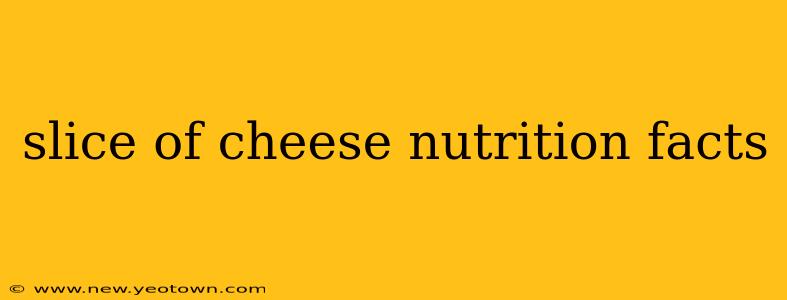Cheese. That creamy, tangy, sometimes sharp, always satisfying dairy delight. It's a staple in countless cuisines, a snacking champion, and a culinary chameleon capable of transforming the simplest dishes. But have you ever stopped to consider just what you're eating when you enjoy that satisfying slice? Let's unravel the nutritional facts behind this humble yet mighty food. This isn't just a glance at the label; we're going on a journey to understand the nutritional profile of cheese and how it impacts your health.
What are the Macronutrients in a Slice of Cheese?
The macronutrient profile of a cheese slice varies wildly depending on the type of cheese. A single slice of cheddar, for example, offers a different nutritional breakdown than a slice of mozzarella or Swiss. However, we can establish some common ground. Generally, a slice of cheese provides a good source of:
- Protein: Cheese is a fantastic source of protein, vital for building and repairing tissues, supporting immune function, and ensuring satiety. The protein content varies depending on the cheese type and fat content, but it's a consistently significant contributor to your daily protein intake.
- Fat: Fat is another major component, again varying significantly. Full-fat cheeses offer a higher fat content, including saturated fats. While saturated fats have received a bad rap, they are a necessary part of a balanced diet in moderation. Lower-fat cheese options are available for those watching their fat intake. The type of fat also varies; some cheeses contain more beneficial fats than others.
- Calcium: Cheese is an excellent source of calcium, crucial for strong bones and teeth. This is particularly important for growing children and adults seeking to maintain bone density as they age.
- Carbohydrates: Most cheeses are relatively low in carbohydrates, often negligible unless additives are included in the production process.
How Many Calories are in a Slice of Cheese?
The caloric content of a slice of cheese, like the macronutrient profile, depends heavily on the type and fat content. A single slice of low-fat cheddar might contain around 50-70 calories, while a slice of full-fat cheddar could easily reach 100 calories or more. Cream cheeses and processed cheeses tend to be higher in calories than natural cheeses. Always check the nutrition label for the specific calorie information relevant to your chosen cheese.
What Vitamins and Minerals are Found in Cheese?
Beyond the macronutrients, cheese offers a range of essential vitamins and minerals. These include:
- Vitamin A: Important for vision, immune function, and cell growth.
- Vitamin B12: Crucial for nerve function and red blood cell formation. Cheese is a great source for vegetarians and vegans who might otherwise struggle to obtain sufficient B12.
- Phosphorus: Essential for bone health, energy production, and other bodily functions.
- Riboflavin (Vitamin B2): Plays a role in energy metabolism and cell function.
- Zinc: Supports immune function and wound healing.
Is Cheese Good for You? What are the Potential Downsides?
While cheese offers many nutritional benefits, moderation is key. High saturated fat content in some cheeses could contribute to high cholesterol levels if consumed excessively. Similarly, the sodium content in some processed cheeses can be high, which could be detrimental for individuals with hypertension. Cheese can also be a trigger for individuals with lactose intolerance.
What are the Different Types of Cheese and Their Nutritional Differences?
The nutritional value varies dramatically between cheese types. Hard cheeses like cheddar generally have a higher protein and fat content than soft cheeses like mozzarella. Processed cheese slices often contain added ingredients, impacting their nutritional profile.
How Can I Incorporate Cheese into a Healthy Diet?
Cheese can absolutely be part of a healthy and balanced diet. Opt for lower-fat varieties, choose natural cheeses over processed ones, and be mindful of portion sizes. Incorporate cheese into meals strategically – as a topping, in moderation within a salad, or as part of a well-balanced snack.
Are There Any Health Risks Associated with Eating Cheese?
As mentioned, excessive cheese consumption, particularly of high-fat and high-sodium varieties, can contribute to health issues like high cholesterol and high blood pressure. Lactose intolerance is another consideration for some individuals. Always consult with a healthcare professional or registered dietitian if you have specific concerns.
This exploration into the world of cheese nutrition emphasizes the importance of understanding the nuances of different cheese types and mindful consumption. Enjoy your cheese, but savor it responsibly!

